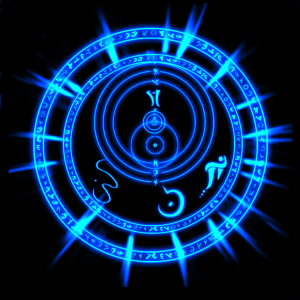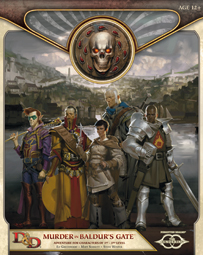![]()
 Imith Anala knows nine languages: Abyssal, Celestial, Draconic, Dwarvish, Elvish, Giant, Orc, Sylvan and Common.
Imith Anala knows nine languages: Abyssal, Celestial, Draconic, Dwarvish, Elvish, Giant, Orc, Sylvan and Common.
Impressive! He’s just one of a few “language master” characters in our current D&D Next: Murder in Baldur’s Gate-inspired Forgotten Realms campaign.
Immediately upon seeing that language list, I knew I wanted to do something new as DM – yet simple and elegant – to highlight character languages and make those multilingual choices flavorful and rewarding.
We’ve all seen them or created them – characters with a ridiculously long and eclectic list of languages. Like me, you’ve probably gone the typical route when an NPC or monster speaks an unusual language – if one of the PCs knows it, you translate the scene aloud right into “Common” on the spot.
Easy, quick and yet – how rewarding is it? Does it really add any flavor or realism to the campaign? What about the characters who really wouldn’t understand the full details of a flirtatious exchange of Infernal between the tiefling bard and the tiefling leader of a band of noble estate squatters? Or when an orc insults or creatively curses out that disgusting elf mage Imith in Orcish – while spitting in his face?
What did I do to make languages more flavorful, and reward the “exclusive” club of characters and monsters with shared uncommon languages? Post-it notes! This simple trick is the right balance of a reasonable amount of words exchanged between speakers of unusual languages. The small physical space of a post-it note limits the DM or player to a reasonable amount of words and time, and the note is easy to pass back and forth and keep away from the sight of those who don’t know the language being spoken.
I’ve observed it’s quite gratifying for the players – they feel good about the specialness of their character’s racial or exotic language – getting to use it with a bit of private creativity and friendly secrecy. As DM, it’s just as enjoyable – it’s like you’re having this private conversation in a strange language while others wonder “what’s really going on.”
 So how do you do speak in tongues exactly – efficiently yet with style?
So how do you do speak in tongues exactly – efficiently yet with style?
To amp up the atmosphere, I first describe what the language sounds like – its smoothness or harshness, its slow or rapid pace, or its low or high pitch. Then I even speak a few exotic-sounding untranslated words as examples of the language. I draw inspiration from real world languages I know or those from books and movies. For classic, civilized languages like elvish, I might take my queues from Tolkien elf language or French. For orc and dwarf, it’s hard to go wrong spitting out some Klingon-inspired language, with the orc version sounding much shorter and harsher than dwarf.
Here I quickly write down the message (short, ~10 words or less) on the post-it note and pass it to the only player or players who speak that language, and watch those particular players take it in. And then – usually with an excited smile – they immediately write down and pass back their response.
Around the table, notice as the rest of the players’ faces fill with curiosity and wonder at what’s being talked about in that strange tongue – all they can do is read mannerisms and facial expressions, and make reasonable (and sometimes terrible or terribly amusing) guesses as to the conversation topic, asking questions – just as we might in the real world in reaction to an unfamiliar language. Some amusing questions you might hear: “What are you two talking about?” “What’s going on?” “What did he say about me?” and – my recent favorite – “Are you flirting with her?”
After the exchange, the players or NPCs can either summarize or say little or nothing at all or simply take some related action. The rest of the players may be delighted to learn that the tiefling has negotiated for some supplies, secretly turning on his charm through his racial language. Or perhaps the players end up utterly insulted or disgusted by the starkness of the elven patrol’s haughty opinions or the orcs’ impossibly crude insults.
Note passing and hand-outs are classic D&D tools – especially for things like found scrolls, books, notes, spells, dreams, nightmares and more. To simply celebrate a character’s mastery of languages and breath more atmosphere into your campaign through the powerful culture of language, exchange a post-it note as a quick and easy path to rewarding languages.
Image Credit: FadedShadow589
